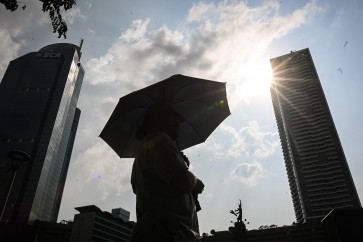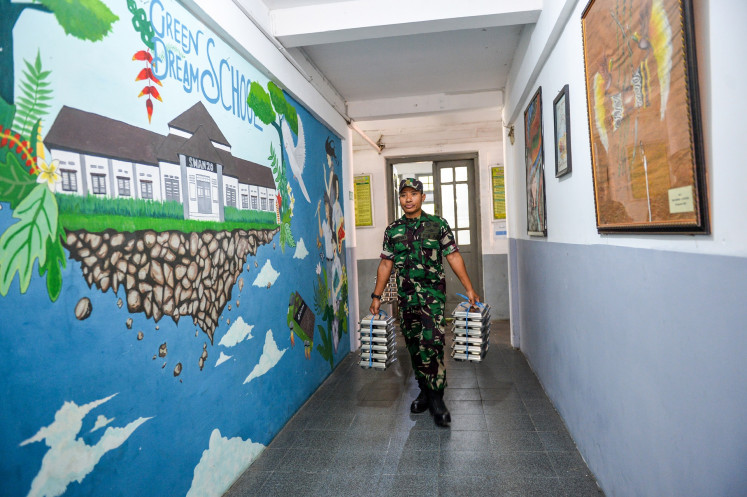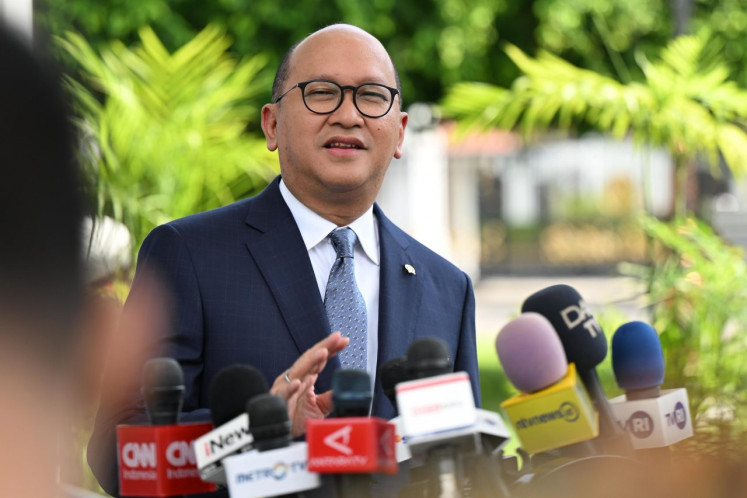Popular Reads
Top Results
Can't find what you're looking for?
View all search resultsPopular Reads
Top Results
Can't find what you're looking for?
View all search resultsScenarios for Aceh's turning point
The latest regulation to apply sharia law in Aceh to all residents â including non-Muslims â has created international headlines
Change text size
Gift Premium Articles
to Anyone
T
he latest regulation to apply sharia law in Aceh to all residents ' including non-Muslims ' has created international headlines.
Some agencies and communities perhaps wonder whether this is still the same region they helped in the tsunami tragedy almost a decade ago, and whether it was a mistake to help such a region that is now keen to push religious law, rather than clean and efficient governance.
Prior to the 2004 tsunami, Aceh was torn by three decades of civil war, as a faction of the Acehnese fought for independence, driven by the injustices of the New Order that saw most oil revenue go to the capital.
Although the Acehnese spoke up against this injustice, they felt Jakarta ignored them as a minority, compared to the largely Javanese ruling elite of the New Order.
The tsunami brought a stronger bargaining position for Aceh as all eyes turned to Indonesia. In its democratic transition, Indonesia needed to win international respect and avoid a loss if a referendum was to take place, such as experienced in Timor Leste. Thus, Jakarta then agreed to formulate a peace agreement to grant Aceh decentralization and for sharia law to be implemented in the area.
Yet, after Aceh gained self-rule, its decentralized government acted in a similar way to its predecessor. In his famed book, The Pedagogy of the Oppressed (1970), Paulo Freire wrote that the oppressed almost always tend to become oppressors because 'the very structure of their thought has been conditioned by the contradictions of the concrete, existential situation by which they are shaped'.
Having only known the repressive language of the New Order, the Acehnese government could not avoid articulating its new power in a similarly repressive language toward minorities, this time toward non-Muslims, to live according to sharia law.
Strengthening sharia law enforcement is arguably a desperate attempt to save face as the Aceh government's credibility is marred by corruption cases.
For example, in 2005 former governor Abdullah Puteh was sentenced to 10 years in the graft case relating to the purchase of an MI-2 Rostov helicopter, amounting to US$1,250,000.
In 2011, the director general of forest and environment conservation under the Forestry Ministry, Darori, and head of Gunung Leuser National Park Andi Basrul, were reported to have colluded in stealing Rp 27.2 billion ($2.3 million) and Rp 1.4 billion in separate cases. The latest controversial corruption case involved sharia police chief Khalidin Loong who is charged of embezzling Rp 650 million.
Conversely, the authorities in Aceh's townships and regencies passing over-the-top sharia regulations, such as a ban on women straddling motorcycles in Lhokseumawe and the ban on women wearing jeans in West Aceh, are also implicated in graft.
In Lhokseumawe, government projects such as the ring road and school construction costs were allegedly marked up. Similarly in West Aceh, the Beureugang Industrial Sector fund was said to be misappropriated, along with indications of graft implicating the regency and councilors.
So far, pushing sharia law is a policy trend to mask corruption in Aceh. But how long will this continue? And what would make the ruling elite move from championing a religious discourse to focus on inclusive policies? We could look at several scenarios.
The first is that corruption becomes so severe, that the local government runs out of funds and Aceh needs to earn outside investment. Investment would compel the province to be managed more efficiently and effectively, with policies focusing less on religion but more on development and competitiveness.
Thus, the above 'oppressor' attitude might not change but external pressure would regulate local rulers' behavior.
The second scenario is that all corrupt officials are jailed and the province manages to elect clean accountable officials who produce good inclusive policies.
These policies aim to improve education, economic development and a sense of security for the entire population.
The second scenario is the most ideal as according to Freire, people must first critically recognize the causes of a given situation, before being able to take transformative action to create a new situation that 'makes possible the pursuit of a fuller humanity'.
However, the key to this scenario is that the demand for changes in the policy direction comes from the Acehnese, and that the new elected officials refrain from becoming future oppressors.
The third scenario is waiting for the next calamity to come and change the attitude of the local government, as in the experience of the tsunami.
Anthropological research by Annemarie Samuels from the University of Leiden confirmed the views conveyed by Acehnese that they see the tsunami disaster as an act of God rather than a tragedy that occurred due to lack of mitigation.
As the end of civil conflict became the silver lining of the disaster, they may now be waiting for more divine signs prior to pushing for policy changes. Using a calamity as a catalyst for change may be an interesting scenario ' but more losses would be too hard to endure.
___________________
The writer is an associate research fellow of S. Rajaratnam School of International Studies, Nanyang Technological University in Singapore and a fellow of the Marthinus Academy in Jakarta.










